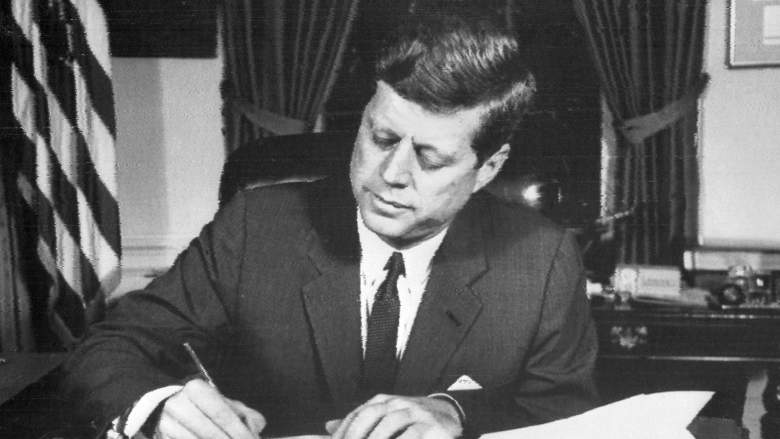
Getty JFK
The remaining JFK assassination files are being released today: Thursday, October 26. Viewing these files won’t be too difficult, but it may take some time depending on just how slammed the server is. When early JFK files were released in July, the National Archives’ server was so overwhelmed that many people couldn’t get the files to download at all at first. The files were released around 7 a.m. Eastern in July, but for many the downloads didn’t start working until sometime that afternoon. So if you’re trying to get the downloads to work today and run into some problems, don’t give up.
Read on to learn how to download the files. You can expect them to be released sometime today.
Once released, the documents will most likely be added to the JFK Assassination Records 2017 webpage here. Scroll down to see links to an October 2017 release (all the links currently on the page are for July 2017.) You can also look in the upper right hand corner, under “What’s New,” to see if any new October documents have been added yet.
To view them, you’ll need decompression software, software to read PDF files, software to listen to any WAV files, and software to view spreadsheets.
Here are step-by-step instructions:
- Visit the webpage here.
- Scroll down until you see the blue hyperlinks labeled October 2017.
- Each hyperlink will take you to a .zip folder. This folder will include PDF files and possible .WAV files. It will also contain a spreadsheet that lists each document in the folder, including each document’s agency, document date, title, source, and senders and recipients.
- You’ll need decompression software, such as WinZip, to open each .zip folder.
- Once you’ve unzipped the file, read the spreadsheet to see the contents of the folder. You’ll need a spreadsheet viewer, such as Microsoft Excel, to read that document.
- Once unzipped, the files within each folder can be viewed whenever you want, as long as you have the right software to view the files.
If the server is too busy, you may get error messages or the file may simply quit downloading. Some folders, even when working correctly, might take 10 minutes or longer to download.
The release of these files has been 25 years in the making. In 1992, the John F. Kennedy Assassination Records Collection Act was approved by Congress and signed by former President George H.W. Bush. This act required that all JFK assassination records be disclosed within 25 years, which falls on October 26, 2017. Federal agencies could contest that release, but only President Donald Trump had a final say in whether some files would be held back for national security reasons.
An official with the National Security Council told The Washington Post that some agencies were asking Trump not to allow the release of all the remaining documents. But from Trump’s most recent tweets, it appears he won’t decide to hold anything back.
It’s not known exactly what will be in the files, but experts have some ideas. Most believe the files won’t contain a new bombshell reveal about JFK. But some topics that may be in the released documents include:
- Mentions of Cuba and the Soviet Union, including how the NSA kept tabs on Cuba’s agents, The Intercept reported.
- Possible CIA operations in Mexico City
- Details about the CIA’s surveillance of Lee Harvey Oswald while he was in Mexico City
- NSA’s knowledge of Cuban agents’ cover names
- Files on top CIA officers from the 60s and 70s who were following Oswald before the assassination
- Jefferson Morley, a former Washington Post reporter, said that these top officers would likely include CIA officer William K. Harvey, who led assassination operations and had frequent feuds with Robert F. Kennedy
- Also possibly files on CIA officer David Phillips, who oversaw ops against Fidel Castro and knew a lot about surveillance of Oswald when he was in Mexico City
- Files about the Watergate burglars,
- CIA personality profiles about Oswald.
- A secret communication between the CIA and the Office of Naval Intelligence marked as “unintelligible.” The communication was about Oswald, weeks before the assassination. In 1963, Oswald’s appeal of a dishonorable discharge was denied, leaving him outraged.
- Some have surmised that national intelligence had urged Trump told delay the release because of recent diplomatic tensions between Cuba and the United States, including claims that Cuba used some type of sonic device against U.S. diplomats and spies, injuring them. Others have said the security agencies were concerned about potential embarrassments, such as pages on Watergate burglars that might indicate they were somehow connected to the CIA.
The released documents are expected to encompass 113,000 pages.
The Warren Commission concluded that Oswald acted alone and there was no foreign or domestic conspiracy.